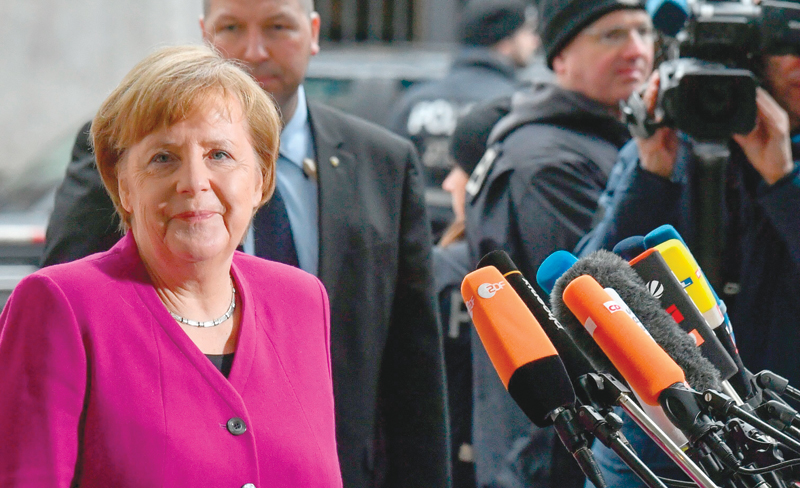

BERLIN: Chancellor Angela Merkel said her conservatives and their Social Democrat (SPD) would-be partners still had much to do if they were to agree a new coalition government, with the parties continuing to haggle over labour rights. The parties secured a flurry of agreements on less contentious issues in their talks on Friday, but, arriving on the eve of a weekend of marathon talks, Merkel said the parties still faced divisions in crucial areas.
“We have good will to overcome them, but there is still a lot of work ahead for us,” she told reporters.
The two camps aim to finalise a deal for four more years of a “grand coalition” by the end of the weekend or early next week, some four months after an inconclusive national election plunged Germany into unaccustomed political uncertainty.
The parties have agreed to some eye-catching measures, including a 50 per cent tax write-down for fleet electric cars and a 12 billion euro public investment programme to improve sluggish data networks, documents seen by Reuters showed.
But in the field of labour rights, where the beleaguered SPD wants to signal to its members that it has set its distinctive stamp on the deal, long lines of text highlighted in yellow showed that the parties had still reached no consensus
The SPD wants to secure a right for employees in larger companies to move seamlessly back and forth between full- and part-time work if they have to care for children or elderly parents. The conservatives, and much of German business, oppose what they see as a costly measure.
Arriving for the final round of talks, SPD leader Martin Schulz said his party would insist on more progress in this and in healthcare, where the party hope to reduce difference in the service experienced by the private and publicly insured.
The centre-left SPD has sagged even further in opinion polls since suffering its worst result of the post-war era in the September 24 election.
Many SPD activists, who must ratify any coalition deal in a postal ballot, would prefer to see their party reinvent itself in opposition rather than join another coalition with Merkel after serving as junior partner in one from 2013 to 2017.
For Merkel, another loveless ‘grand coalition’ is her best chance of securing a fourth term after the failure of earlier talks with two smaller parties late last year.
Her conservative bloc and the SPD have already agreed terms in other areas. Germany’s booming economy has allowed them to agree an extra 11 billion euros for education, and compromise deals have been reached on migration and healthcare policy.
Some of the accords are noticeably less ambitious than those reached in the previous talks with the two smaller parties. Then, negotiators agreed to spend 20 billion euros over a longer period on building a better national broadband network. Privatisations are also now off the agenda.
Despite the differences between the parties, Horst Seehofer, Merkel’s Bavarian ally, whose party has in the past been most sceptical about a renewed coalition with the SPD, was optimistic.
“I think we’ll get this done in the coming days,” Seehofer told reporters on arrival for negotiations. “So far, there is no reason to expect we will need longer than Sunday.” — Reuters
Oman Observer is now on the WhatsApp channel. Click here



